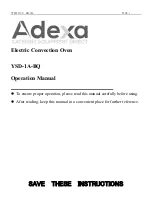
en
Tested for you in our cooking studio
42
Roasting, braising and grilling
Here, you will find information on roasting, braising and
grilling poultry, meat and fish. The settings tables list the
optimal settings for a wide range of dishes.
Poultry
When cooking duck or goose, pierce the skin on the
underside of the wings. This allows the fat to run out.
If using duck breast, score the skin. Do not turn duck
breasts.
Add some liquid to the poultry in the dish. Cover the
base of the ovenware with approx. 1-2 cm of liquid.
When you turn poultry, ensure that the breast side or
the skin side is underneath at first.
Poultry will turn out particularly crispy and brown if you
baste it towards the end of the roasting time with butter,
salted water or orange juice.
Meat
Baste lean meat with fat as required or cover it with
strips of bacon. Score the rind crosswise. If you turn the
joint when cooking it, ensure that the rind is underneath
to begin with.
When the joint is ready, turn off the oven and allow it to
rest for a further 10 minutes in the cooking
compartment, keeping the door closed. This helps
distribute the meat juices more evenly. Wrap the joint in
aluminium foil if necessary. The recommended resting
time is not included in the indicated cooking time.
Fish
Whole fish does not need to be turned.Place the whole
fish into the cooking compartment in its swimming
position, with the dorsal fin at the top. Placing half a
potato or a small oven-proof container in the stomach
cavity of the fish will keep it upright.
You can tell when the fish is cooked because the dorsal
fin can be removed easily.
Roasting and braising on the wire rack
On the wire rack, poultry and meat will become very
crispy on all sides.Roasting on the wire rack works
particularly well for large poultry or for multiple pieces at
the same time.
Add up to 1/2 litre of water to the universal pan,
depending on the size and type of meat. Any dripping
fat and meat juices will be caught. You can make a
sauce from these juices. This will also result in less
smoke being produced and keep the cooking
compartment cleaner.
Slide the universal pan into the oven at the indicated
shelf position with the wire rack on top. Ensure that the
wire rack is correctly positioned on the universal pan.
Roasting and braising in cookware
:
Warning – Risk of injury from shattering glass!
Place hot glass cookware on a dry mat after cooking.
The glass may crack if placed on a cold or wet surface.
:
Warning – Risk of scalding!
Very hot steam may escape when opening the lid after
cooking. Lift the lid at the rear, so that the hot steam
can escape away from you.
It is more convenient to roast and braise meat in
cookware. You can take the joint out of the cooking
The baked item is too light in colour
overall.
If the shelf position and the accessories are correct, then you should increase the temperature if necessary or
extend the baking time.
The baked item is too light on top, and
too dark underneath.
Bake the cake one level higher in the oven the next time.
The baked item is too dark on top,
and too light underneath.
Bake the cake one level lower in the oven the next time. Select a lower temperature and extend the baking
time.
The baked item is too dark in a tin or
loaf tin.
Place the baking tray in the middle of the accessory, not directly against the back wall.
The baked item is too dark in colour
overall.
Select a lower temperature next time and extend the baking time if necessary.
The baked item is unevenly browned. Select a slightly lower temperature.
Protruding greaseproof paper can affect the air circulation. Always cut greaseproof paper to size.
Ensure that the baking tin does not stand directly in front of the openings in the cooking compartment back
wall.
When baking small items, you should use similar sizes and thicknesses wherever possible.
You were baking on several levels.
The items on the top baking tray are
darker than those on the lower baking
tray.
Always select hot air when baking on several levels. Baked items that are placed into the oven on trays or in
baking tins at the same time will not necessarily be ready at the same time.
The baked item looks good, but is not
cooked properly in the middle.
Use a lower temperature and bake slightly longer; if necessary, add slightly less liquid. For baked items with a
moist topping, bake the base first. Sprinkle it with almonds or breadcrumbs and then place the topping on top.
The baked item cannot be turned out
of the dish when it is turned upside
down.
Allow the baked item to cool down for 5 to 10 minutes after baking. If it still sticks, carefully loosen it around
the edges again using a knife. Turn the baked item upside down again and cover it several times with a cold,
wet cloth. Next time, grease the baking tin and sprinkle with breadcrumbs.











































